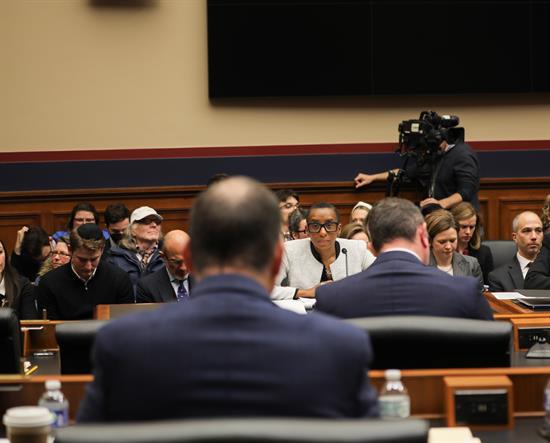Today, the
Committee called on the presidents of
Harvard,
UPenn, and
MIT to answer for the rampant antisemitism engulfing their campuses and threatening their Jewish students.

Chairwoman Virginia Foxx (R-NC) opened with a moment of silence for the victims of the bloody war launched by Hamas on October 7th, then transitioned to scalding opening remarks which charged academia’s radical Left ideologies with fomenting antisemitism.
She posed two questions to the college presidents: “Do you have the courage to truly confront and condemn the ideology driving antisemitism? Or will you offer weak, blame-shifting excuses and yet another responsibility dodging taskforce?"
Predictably, the presidents chose option two. Each came prepared with nearly identical, canned remarks. Each condemned antisemitism, the bare minimum. Each equated antisemitism with less pervasive anti-Palestinian sentiments. Each made promises to establish do-nothing task forces.
None recognized their campuses as hotbeds of antisemitism. None gave concrete examples of student punishments for violating campus anti-violence codes. Above all, none recognized the direct causal link between campus Left wing ideologies and antisemitism.
With the reputation of universities being that they promote complete ideological convergence, witness testimony fell flat when different messengers delivered the same words.
The hearing then turned to the question-and-answer portion and the inflexibility of elite academic institutions was on full display.
Representative Glenn Grothman (R-WI) relied on data pulled from Harvard’s own Crimson newspaper, citing surveys that stated only 2 percent of the university faculty rate Donald Trump something other than poor, and 1 percent of students voted for Trump in 2020.
When he questioned her on this apparent viewpoint singularity, Dr. Claudine Gay, President of Harvard University, echoed empty platitudes from her opening about striving for “as diverse a faculty as we can.”
Not convincing.
When it was her turn, Republican Conference Chairwoman Elise Stefanik (R-NY) unleashed a litany of pointed questions at President Gay.
“A Harvard student calling for mass murder of African Americans is not protected free speech at Harvard, correct?”
“Will admissions offers be rescinded or any disciplinary action be taken against students or applicants who say, ‘from the river to the sea’ or ‘intifada?’”
“Harvard receives funding from foreign entities and governments for their Middle Eastern Studies Department, yes or no?”
Each question could be answered with a “yes” or “no.” To each question, President Gay deflected. For the sake of Jewish student across the country, this moment demands greater moral clarity from our leaders.
Rep. Burgess Owens’s (R-UT) questions connected the rise of campus DEI practices with emerging antisemitism. Specifically, he raised concerns over the ethics of Harvard’s black-only, Hispanic-only, and gay-only graduation ceremonies. He asked President Gay, “Is it ok to segregate people based on their color?”
To which she remarkably replied, “I oppose segregation.” More empty words or a commitment to end this dreadful practice?

A common theme throughout the hearing was universities’ newfound affinity for the freedom of speech, which they conveniently stumbled upon on October 7th. Members widely cited the FIRE 2024 Free Speech Report, which ranks Harvard as dead-last, and UPenn, second-to-last. In response to Dr. Gay’s claims against the validity of the report, Rep. Kevin Kiley (R-CA) had choice words for Harvard: “You don’t get to be dead last without there being some truth there.”
Rep. Jim Banks (R-IN) zeroed in on UPenn’s selective commitment to free speech. He listed examples such as UPenn canceling a 2013 Narendra Modi address, punishing law professor Amy Wax for unsavory views, and revoking an event with a former Trump ICE Director.
“Ms. Magill, the fact is that Penn regulates speech that it doesn’t like. Everyone gets this,” said Rep. Banks.
Ultimately, the question must be asked, why should the federal government continue to fund a system so intolerable of dissenting views, so bereft of a moral compass, and so disconnected from the American people?
Reps. Bob Good (R-VA) and Brandon Williams (R-NY) both contemplated this question aloud. They recognized that the billions in grants, contacts, research investments, student loan guarantees, and other sweetheart deals are all privileges the federal government bestows upon universities—not an unconditional blank check.
Maybe it’s time we rethink what those conditions should be.
Bottom line: The Committee held college presidents’ feet to the fire over the social, cultural, and political campus conditions giving rise to rampant antisemitism.


